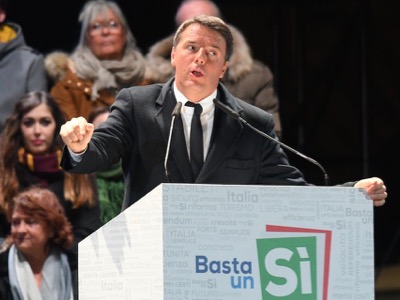Centralization: this was the overriding mission of the Constitutional reform proposed to and rejected by the Italian people. Thus the proposal was to increase the powers of the Prime Minister and take away the correlating powers vested in the regions. The reform also made no headway on wiping out the prohibition on war contained in article 11 of the Italian Constitution.

Most Italians, distrustful of the broad powers vested in Renzi, have foiled his reform plans which flout the constitution. But in order for a new path to be laid out for our country, [yet] another fundamental “No” is needed: “No” to the military “reform” that has rendered Article 11, one of the fundamental pillars of our Constitution, inoperable. Internal economic and political choices, such as those proposed by the Renzi government and rejected by the majority of Italians, are actually inextricably linked to foreign and military policy choices. One lot is functional to the other. When quite properly, a proposal is put to us to increase social expenditure, we cannot ignore the fact that everyday Italy is burning up 55 million euro on military expenditure (a figure provided by Nato, [but] which is actually much higher). When it is correctly asked that the citizens have a say in the domestic policy, we cannot ignore that they have no say on foreign policy which continues to be channelled towards war.
When the referendum campaign was underway, Admiral Backer of the U.S. Navy’s announcement made at the beginning of November passed almost in total silence:
“Muos’s terrestrial station at Niscemi, which covers most of Europe and Africa is operational”.
Built by General Dynamics – a US giant in the military industry with an annual turnover of 30 million dollars - the station at Niscemi is one of Muos’s four terrestrial stations (the others are in Virginia, Hawaii and Australia). Among the satellites of Lockheed Martin – [yet] another US giant in the military industry with a 45 billion turnover – Muos connects to the Pentagon’s network of command, submarines and warships, bomber fighters and drones, military vehicles and terrestrial units moving in any part of the world they are in.
When the Muos station at Niscemi started to be operational, this empowered Italy’s role as the launching pad for US/Nato military operations towards the South and East at the very time that the USA was getting ready to install the new B61-12 nuclear bombs on our territory. Furthermore, the “plan for European defense” presented by Federica Mogherini also passed in almost complete silence during the referendum campaign: this provides for the commitment of battle groups, which can be deployed within 10 days up to 6,000 km from Europe. In the second half of November the biggest battle group, of which Italy is the “guiding nation”, carried out the exercise, “European Wind 2016” in the province of Udine. In this exercise, 1,500 soldiers from Italy, Austria, Croatia, Slovenia and Hungary participated, with a hundred armoured vehicles and many helicopters. Since January, the Italian-led battle group, whose full operational capacity has been certified, has been ready for deployment in “crisis areas” notably in Eastern Europe. So as to avoid coming to blows with Washington, Mogherini has made it clear that this “does not mean creating a European army but a more effective defense system, which fully complements Nato’s.” Translation? The EU wants to increase its military force which is still under US command in Nato (of which 22 of the 28 EU member states are members).
Meanwhile, the NATO Secretary General thanks the newly elected president Trump for “flagging up the issue of military expenditure”, specifying that “despite the progress made in carving up duties, there is still much to be done”.
In other words, the European Nato members will have to bear a far greater military expenditure. The 55 million euro that we pay every day for the military, will soon increase. But on this point there will be no referendum.
The translator’s (Marie-Ange Patrizio) notes accompanying the French Translation
1) Article 11 of the Italian Constitution reads: “Italy rejects war as a means of attacking the liberty of other peoples and as a way of international dispute resolution; it allows, on a reciprocal basis with other States, necessary limitations of sovereignty, to achieve an order that ensures peace and justice among nations; it helps and promotes international organizations in their pursuit of this goal.”
2) For France, military expenditure is estimated at a bit more than 109 million euro per day in 2016.

 Articles by this author
Articles by this author Send a message
Send a message











Stay In Touch
Follow us on social networks
Subscribe to weekly newsletter